Economic and Social Changes: Facts, Trends, Forecast @volnc-esc-en
Статьи журнала - Economic and Social Changes: Facts, Trends, Forecast
Все статьи: 1763
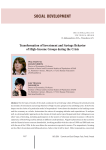
Transformation of investment and savings behavior of high-income groups during the crisis
Статья научная
On the basis of results of the study conducted in several large cities of Russia the article presents key models of investment and savings behavior of high-income groups in the unfolding crisis. It shows the impact on the choice of a particular model of respondents’ views about the situation in the banking sector and the economy as a whole, determines the nature of emerging attitudes and expectations. It analyses well-to-do households’ approaches to the choice of a bank and a type of deposit and their willingness to use other ways of investing, including participation in the system of voluntary pension insurance; reflects the experience of borrowing and the attitude to different credit products. Negative phenomena in the economy and the financial sector concern households, invoking parallels with the crises of 1998 and 2008 and even with the era of the 1990s. In the near future the recession is expected to worsen. The respondents, focusing on the effect of sanctions and falling oil prices, believe that it will be short...
Бесплатно
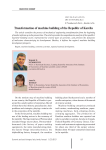
Transformation of machine building of the Republic of Karelia
Статья научная
The article considers the process of mechanical engineering transformation from the beginning of market reforms up to the present time. The article provides the comprehensive analysis of the republic’s machine-building sector, represented by several types of activities, and presents the dynamics of indicators characterizing its development. Besides, it defines the region’s machine building development prospects.
Бесплатно
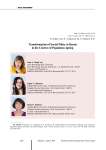
Transformation of social policy in Russia in the context of population ageing
Статья научная
Modern social policy in Russia is formed under the influence of population ageing. The paper presents our point of view on the current state of Russia's social policy. The relevance of the study is due to the fact that the demographic situation is undergoing inevitable changes and the role of the elderly in socio-economic life is becoming increasingly important. The goal of our work is to investigate the specifics of social policy in Russia in the context of population ageing. The novelty of the work consists in the fact that it dwells upon the capabilities of the social group “elderly” as a social resource. We mainly use the following research methods: analysis of laws and regulations at various levels, analysis of statistical and demographic data and results of sociological surveys conducted by VolRC RAS, and content analysis of website materials. The study was carried out both at the national and regional levels (on the example of the Vologda Oblast). We reveal trends in reorienting Russia's social policy toward a broader interpretation of ageing and application of the concept of active longevity. However, the values of active longevity indices in Russia are low in comparison with European countries. According to sociological surveys, the elderly population of the region, which includes citizens over 60 years of age, preserves the values of active life, and many today's pensioners do not think their state of health can interfere with their ability to work. We show how interaction between the state, civil society and citizens is developing in modern social policy. We reveal territorial unevenness in the development of the non-profit sector that addresses social problems of older citizens. In the end, we put forward proposals on updating social policy in the country in the context of population ageing.
Бесплатно
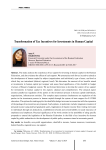
Transformation of tax incentives for investments in human capital
Статья научная
The study analyzes the experience of tax support for investing in human capital in the Russian Federation, and also evaluates the effects of such support. We systematize tools for tax incentives aimed at the development of human capital by subject (organization and individual), type of taxes, and level at which they are introduced (federal, regional, local). We determine the amount of tax benefits aimed at investments in human capital per taxpayer and assess fiscal significance of the shortfall in budget revenues of Russia’s budgetary system. We put forward directions to develop the system of tax support for investments in human capital in two aspects: classical and comprehensive. The classical aspect assumes parallel tax regulation of the parties to the investment process in human capital (individuals, organizations, infrastructure entities). The complex aspect assumes simultaneous tax regulation of the parties to the investment process in human capital through the system of state support for E-STEM education. The options for making up for the shortfall in budget revenues in connection with the expansion of the package of tax incentives are proposed. Such options, in particular, include: progressive taxation of personal income using indexed graduated scales, legalization of shadow income from renting real estate to individuals through tax deductions, establishment of joint and several liability in social insurance of employees and employers. Practical significance of the work consists in the possibility of using specific proposals to amend the legislation of the Russian Federation in the field of tax incentives for human capital by public authorities in the development of public policy measures aimed at economic growth.
Бесплатно
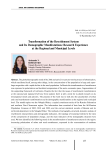
Статья научная
The global demographic trend of the 20th and early 21st century was the process of urbanization, which manifested itself, among other things, in the concentration of the population in large and superlarge megacities with a rapid decline in the rural population. In Russia the transformation of resettlement was expressed in polarization and localized compression of the socio-economic space, fragmentation of the supporting framework of territories. Despite the fact that the issues of resettlement transformation at the national and regional level have been studied, there is still a need for in-depth research on its intraregional trends and patterns. The purpose of the work was to look into the peculiarities of urban and rural resettlement transformation and its demographic manifestations at the regional and municipal level. The model region was the Vologda Oblast, a typical constituent entity of the Russian Federation and northern Non-Chernozem region. The information base consisted of data from the All-Russian Population Censuses of 2002, 2010 and 2020, and the current statistical records of Rosstat and its territorial department in the Vologda Oblast. The methods of cartography, structural-dynamic analysis of resettlement characteristics and demographic indicators, the typology of municipal entities by the ratio of the components of population change, and the main indicators of the demographic situation were used. We have identified the following trends in the transformation of resettlement systems in the region: increasing polarization of urban and rural resettlement, expressed in the concentration of residents either in large or in small settlements; depopulation of rural areas; weakening of the supporting framework of urban resettlement (system of small towns); strengthening “focality” rural settlement. In more than half of the Vologda Oblast municipal entities the urban and rural population decrease is caused by the double effect of natural and migration losses. At the same time, the number and the share of such municipalities have grown significantly over the past 20 years. Some municipalities have the potential of migration growth or age structure, but only in Kaduysky District there is an increase in population due to the migration growth of urban residents. In the conclusion the threats and opportunities for development for different types of municipalities are outlined.
Бесплатно
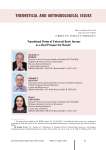
Transitional forms of universal basic income as a real prospect for Russia
Статья научная
The article presents the research results aimed at developing the theoretical provisions of the universal basic income concept summarizing and systematizing the results of a survey of Russian experts conducted by the authors about its principles, the possibilities of introduction in Russia, priority population categories for testing it, assessing the reality of expanding the tools of universal basic income taking into account the development of transitional forms of its use during the COVID-19 pandemic. The work reveals the relevance of UBI concept development in the context of the need to overcome mass poverty in Russia. The result of the theoretical analysis shows that generally recognized UBI principles (universality, unconditionality, individual nature of monetary payments, their regularity) are justified by long-term trends in social policy evolution. The prospect of introducing universal basic income is presented as a qualitative transition (leap) in implementation of the latter. The social policy measures, closest to implementation of UBI principles, are characterized as its transitional forms including experiments on its introduction. To assess the practical feasibility of UBI transitional forms, the article uses the results of a survey of experts from different Russian regions conducted with the authors' participation and a pilot experiment and modeling of the results of UBI toolkit implementation. The paper proposes a possible scheme for implementing UBI tools in Russia, as well as pilot projects for low-income families with children, graduates of universities and secondary vocational educational institutions during the transition from study to the first place of work, the unstable employed (including the unemployed). The authors assess the paradox of activating the implementation of UBI principles in the context of the COVID-2019 pandemic under unfavorable financial conditions as confirming the reality of the prospects for its transitional forms for Russia. The results of the study can contribute to the development of discussions about the introduction of UBI tools in the Russian Federation, and to the promotion of its wide experimental testing for different population categories. It is advisable to continue research in the aspect of analyzing the experience of developing social support in the context of a pandemic and modeling the possible effects and costs of introducing UBI.
Бесплатно
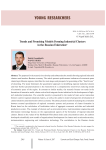
Trends and promising models forming industrial clusters in the Russian Federation
Статья научная
The purpose for the research is to develop and substantiate the models forming regional industrial clusters amid modern Russian economy. The article presents performance indicators of economic space clustering in Russian regions, identifies the main stages and prospects for generating of the “fourth wave” of clustering. The study formulates the quantitative approach to identifying regional industrial clusters and their further parameterization in the framework of a comprehensive multi-level clustering model of economic space of the region. In contrast to similar studies, the research focuses on trends in the formation of innovative multi-cluster units which integrate cluster initiatives for the development of high-tech industrial production. The scientific novelty is presented by the model of inter-sector interaction between current regional industrial clusters, as well as the author's model of perspective development of cluster initiatives amid innovation-driven economy...
Бесплатно
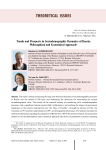
Trends and prospects in sociodemographic dynamics of Russia: philosophical and economical approach
Статья научная
The study is aimed at analyzing the long-term historical dynamics of sociodemographic processes in Russia over the period of 500 years and elaborating the directions for overcoming the current sociodemographic crisis. The novelty of the research consists of considering cyclic sociodemographic processes with a significant horizon period (half a millennium), and studying the impact of government regulations in the country starting from the “the Time of Troubles”, through the reforms of 1861, the revolution of 1917 and the transformation of 1991, on demographic bifurcations. The authors introduce the statistical information regarding the population of Russia from 1500 to the present moment; the researchers propose to use the philosophical and economical approach (the theory of population economy) analyzing the population problems based on the theory of economy's philosophy and the theory of economy by S.N. Bulgakov and Yu.M. Osipov, the professors from the Lomonosov Moscow State University; and by 2025 to elaborate and adopt the social doctrine of the Russian Federation. Using the historical material the authors prove that the mechanisms and institutions of state regulation in the country can create conditions affecting the change of the population's reproductive behavior. The article presents the comparative analysis of the proposed theory of “population economy” and traditional ones of economic demography and population economics, and describes the main postulates of the theory of “population economy”. The researchers mark the factors that should be taken into account in composing the social doctrine of the Russian Federation. The research results can be used for justifying the long-term strategy of the sociodemographic policy in Russia.
Бесплатно
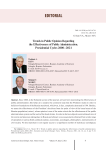
Статья научная
Since 2008, in the Editorial section of the journal, we have been monitoring the effectiveness of public administration; this helps us to analyze the consistent steps that the President makes in order to build new foundations of the Russian statehood, which was, in fact, completely destroyed in 1991. Besides, we assess the effectiveness of the President’s decisions from the point of view of the broad strata of the Russian population (voters), whose opinion is one of the main criteria for the effectiveness of the public administration system and the work of the head of state. In order to form an objective and unbiased view of the events and processes taking place in Russia and abroad, we use assessments obtained from a wide range of specialists in various fields: political analysts, economists, sociologists, philosophers, representatives of civil society. No less important is our regular access to a significant number of statistical, sociological, Russian and foreign databases; by using them comprehensively, we can look at the situation in the country and assess the effectiveness of public administration from the point of view of not only individual experts, but also voters. The main information source of sociological data in our research is the public opinion monitoring that we have been conducting in the Vologda Oblast since 1996. Regularly, once every two months, we carry out a survey covering 1.5 thousand residents of the region, thus obtaining an average annual “cross-section” of public opinion based on the estimates of nine thousand voters representing the main social strata and groups that differ in income, territory of residence, employment, marital status, education and many other socio-demographic characteristics. Due to a monitoring nature of the research, we can observe how, in the course of time, the events and decisions taken by the head of state are lined up in a clear, consistent, logically verified line, which many experts can see. But the majority of voters who observe “with the naked eye” the situation in the country and the actions of the authorities, do not see this line, because it is perceived on a subconscious and routine level, that is, based on the general opinion prevailing in their environment and stereotypes that people develop through their own life experience, the experience of relatives and friends (including negative life experience of the 1990s). This is why our editorial articles often supplement the analysis of latest events and processes in Russia and abroad with a retrospective look at the management decisions that preceded them. We pay special attention to the principle of historicism, and in this regard it is important for us to build a chronology of events. The current article is the last one in 2021; it briefly summarizes the analysis of public administration effectiveness in the context of Vladimir Putin’s presidential terms, with an emphasis on the first four years of the fourth presidential cycle (2018-2021).
Бесплатно
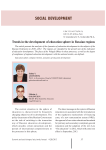
Trends in the development of education sphere in Russian regions
Статья научная
The article presents the analysis of the dynamics of education development in the subjects of the Russian Federation in 2010-2012. The regions are classified by the growth rate of the indicators of education development. The place of the Vologda Oblast in these processes, as well as the degree of compliance of regional education development with the national results, are defined.
Бесплатно
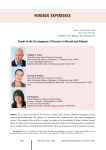
Trends in the development of forestry in Russia and Finland
Статья научная
The article is devoted to the forestry in Russia and Finland considered through economic relations developing under the influence of national forest legislation and state forest management systems. The purpose of the article is to assess the trends in the development of forest relations formed within the framework of national forest regulations and their respective forest management mechanisms on the example of two countries: Russia and Finland. The study is based on a system approach to forestry considered from an ecological and economic perspective, using subject-object, abstract and logical methods, comparative, spatial, statistical analysis, modern theories of sustainable development, as well as foreign and domestic experience of forest relations. The research novelty lies in revealing trends in the development of forest economy formed under the influence of national forest legislation systems, forest management systems taking into account population’s opinion. The ratio of organizational-administrative and economic methods of forest management by public authorities of the two countries are analyzed. The economic efficiency of forest management in two countries is compared through contrasting costs and revenues of forestry. The positive and negative trends of the Russian forest economy since the beginning of the administrative reform in the country are analyzed. Trends in forest economy, environment and sociology showed are more negative rather than positive. The research results can be in demand by research institutions forecasting the development of sectoral economies, forest organizations for building economic relations between the state, forestry business and the population. The study can be continued in terms of assessing trends in the development of forestry as an eco-economic system with a long manufacturing cycle, taking into account the new paradigm of thinking about the role of renewable forest resources in human life.
Бесплатно
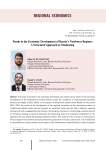
Статья
The study is devoted to the systematic monitoring and analysis of key trends in the economic development of the Northwestern Federal District under the conditions of unprecedented sanctions pressure that began in 2022. Based on an analysis of operational statistics from Rosstat for the period 2022–2024, key trends in the development of the regional economies of the constituent entities in Northwestern Russia under external pressure are identified. Achieving the study's objective required solving such tasks as aggregating and critically reviewing the experience of monitoring economic growth in territories, forming a system of indicators for monitoring short-term economic development at the regional level, and testing the proposed indicator system. The analysis of the economy is conducted at the key stages of the economic process (production, generation of income, and its use). It is revealed that in the production of gross product in the regions of the Northwestern Federal District, trends of regional specialization are intensifying – the locomotives of positive dynamics in industry and agriculture are the leading regions in these types of activities, while in other regions the dynamics are either insignificant or negative. A transformation in the structure of income distribution in the economy of the Northwestern Federal District is observed: business and state incomes are shifting in favor of household incomes against the backdrop of a labor market shortage and an incomplete adaptation to external pressure. Due to rising household incomes, consumer demand shows sharp positive dynamics and becomes a key factor for economic growth. To address the identified problems, directions for economic policy are proposed, which could contribute to accelerating and improving the quality of economic growth in the regions of Northwestern Russia.
Бесплатно
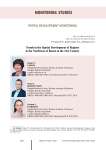
Trends in the spatial development of regions in the northwest of Russia in the 21st century
Статья научная
Russia, being the largest country in the world in terms of territory, attaches great importance to the effective use of its vast space. The paper considers findings of a monitoring of the current situation and key trends regarding spatial development of the Northwestern Federal District and the RF constituent entities included in it. Spatial development of the macro region is studied from the position of centerperipheral and frame approaches; spatial organization is considered taking into account the transformation of the settlement, production, economic and infrastructural frames. The conclusion is made about the increasing nature of the centripetal vector of development and peripherization at the macro and intraregional levels (this is especially acute in the regions of the North). In addition, the paper presents current estimates (2020-2023) of the ranks of Northwestern regions among RF constituent entities on key indicators of spatial development, which can be used by federal and regional authorities as part of monitoring and revising their policies. We prove that an important task is to create conditions conducive to the development of the spatial frame of the macro region by unlocking the potential of various kinds of localities (cities and agglomerations of various levels of hierarchy, rural, industrial periphery). We substantiate a set of measures to increase the connectivity of the macro region’s space, which are in line with the priorities of the new Concept and draft Strategy for Spatial Development of the Russian Federation until 2036.
Бесплатно
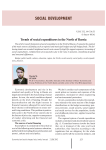
Trends of social expenditures in the north of Russia
Статья научная
The article reveals the features of social expenditures in the North of Russia. It contains the analysis of the main sources of funding such as regional and municipal budgets and off-budget funds. The following trends are revealed: heightened social costs caused by high life-support expenses, increasing of social expenditures, reinforcement of social policy due to the raise in pensions, smoothing of spatial and structural differences.
Бесплатно
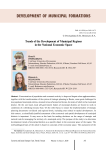
Trends of the development of municipal regions in the national economic space
Статья научная
Concentration of population and economic activity in large and largest urban agglomerations, together with the transformation of the system of strategic planning in Russia, cause great challenges for less populated municipal entities, situated in less urbanized territories, the main of which is the municipal district. On the one hand, local self-government bodies of municipal districts are forced to work in conditions of a shrinking resource base. On the other hand, to ensure the implementation of strategic planning documents on federal and regional levels, including ones related to spatial development. In this context, a scientifically justified assessment of the economic and spatial development of municipal districts is important. It may serve as the basis for making decisions on the usage of strategic and tactical tools for managing the territory of a municipal entity. The purpose of the study is to determine development trends of municipal districts as a specific object in the economic space of the region. The methodological basis of the article is based on concepts of the economic space. The assessment of the economic and spatial development was based on groups of indicators that reflect three parameters of the economic space: intensity, the development of the physical basis, and connectivity. On the basis of the results of calculating the presence indices and analyzing time series, a generalized score of the economic and spatial development of municipal districts is given. According to it, the types of trends, depending on the impact of the economic space of the region (constructive or destructive), are identified. Approbation of the methodology on the example of municipal districts of the Chelyabinsk Oblast showed that urban areas have a significant impact on the economic space of the region in the field of agricultural production, despite the industrial specialization of the region; it confirmed the trend of movement of labor and capital into urban districts; allowed stating negative dynamics of the development of physical basis of the economic space and the unsatisfactory situation in terms of the connectivity of the economic space. The analysis made it possible to formulate four directions of the economic and spatial development of municipal districts. It may become the basis of tactical and strategic tools for regional and municipal management.
Бесплатно
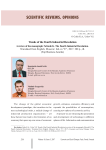
Trends of the fourth industrial revolution
Статья научная
A review of the monograph: Schwab K. The Fourth Industrial Revolution.Translated from English. Moscow: Izd-vo “E”, 2017. 208 p., ill. (Top Business Awards)
Бесплатно
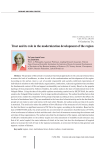
Trust and its role in the modernization development of the region
Статья научная
The purpose of this article is to analyze theoretical approaches to the concept of social trust, to assess the level of confidence, to show its role in the modernization and development of the region. According to the author, trust is a set of socially responsible and socially confirmed expectations of individuals in relation to other individuals, organizations, institutions, rules and regulations that constitute the fundamental content of life and support sustainability and cohesion of society. Based on the popular typology of trust proposed by Anthony Giddens, the author analyzes the state of institutional trust in the Vologda Oblast. Using the data of the public opinion monitoring carried out by ISEDT RAS, the article analyzes the Vologda Oblast residents’ trust in major political institutions. The author identifies factors that generate trust, studies the composition of the groups of people according to trust, and shows the effects of a low level of institutional trust...
Бесплатно
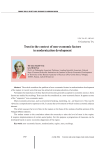
Trust in the context of non-economic factors in modernization development
Статья научная
The article considers the problem of non-economic factors in modernization development of the region; in recent years this issue has attracted increasing attention of scientists. Nowadays the importance of these factors has become generally accepted in economic science; these factors are studied by sociology. Trust can also be considered as a non-economic factor. It appears as one of the “expensive” non-economic assets. Many economic processes, such as investment banking, marketing, etc., are based on it. Trust can be viewed as a comprehensive response to risk. It creates the environment in which various economic subjects interact. The article assesses the level of trust in the region on the basis of the analysis of public opinion of theVologda Oblast residents. The author comes to the conclusion about the necessity to raise the level of trust in the region. It requires implementation of certain social policy. For this purpose a programme of measures can be developed based on socio-economic diagnostics of the region.
Бесплатно
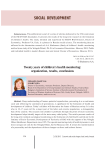
Twenty years of children's health monitoring: organization, results, conclusions
Статья научная
Deep understanding of human potential reproduction, presenting it as a continuous cycle and reflecting the continuity of generations, is significant for the formation of health and development of children. Today’s children will determine the future of Russian society. It is they who in 10-15 years will be a major part of the labor and creative population, a demographic base of the country. The research into children’s problems through the prism of socio-economic development helps identify targets of the state many-sided policy. The article presents results of the long-term medical sociological monitoring on the formation of child health carried out by the Institute of Socio-Economic Development of Territories of RAS with the support of the Vologda Oblast Healthcare Department since 1995. The special monitoring study of health dynamics in real time is unique not only for the Vologda Oblast, but for Russia as well. It reveals the transformation of a personality and the dependence of these changes on direct and indirect factors...
Бесплатно
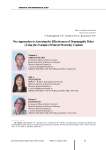
Статья научная
Recently, attention to assessing the effectiveness of measures aimed at promoting birth rate has been increasing. Among these measures, federal maternal (family) capital is, doubtless, the most significant one; thus, it is necessary to develop methodological approaches so as to assess the impact of specific demographic policy measures, in particular maternity capital, on birth rate dynamics. The aim of the study is to design a methodology for evaluating and measuring the effectiveness of federal maternity capital based on official statistics. The article presents two approaches to the methodology for evaluating the effectiveness of federal maternal (family) capital: the first is based on current accounting data, the second is based on census and micro-census data. Within the framework of the first approach, we consider it necessary to apply age-related birth rates for second births in real generations of women, that is, attributed to generations rather than calendar years. The second approach is based on the information about reproductive intentions. In accordance with this information, data on the average expected number of children, according to the 2015 micro-census, and the average number of children born according to the results of the 2020 census are compared. The proposed methodology helps to obtain estimates of the effectiveness of demographic policy measures, taking into account their target orientation (for example, an increase in the birth rate of a certain order or in women of certain age groups). The approbation of the proposed approaches on the example of assessing the effectiveness of maternity capital indicates the expediency of their application. Scientific novelty of our research consists in the convergence of the two approaches in order to measure the effectiveness of federal maternity capital, and in the methodology for using more detailed birth rate indicators in assessing demographic policy measures. The approbation of the approaches has not only analytical capabilities, allowing us to study birth rate in real generations of women according to the order of births and characterize reproductive attitudes; it also substantiates the conclusions about the effectiveness of federal maternity capital.
Бесплатно

